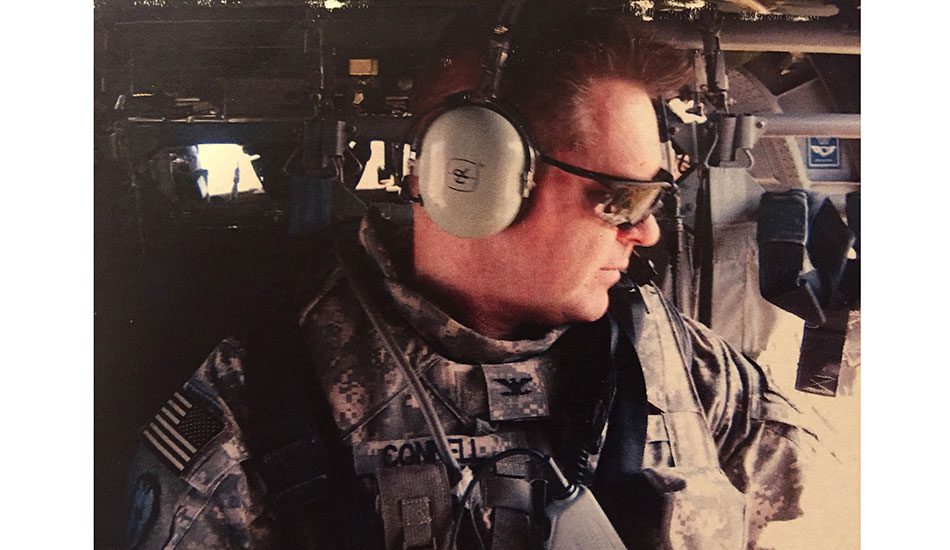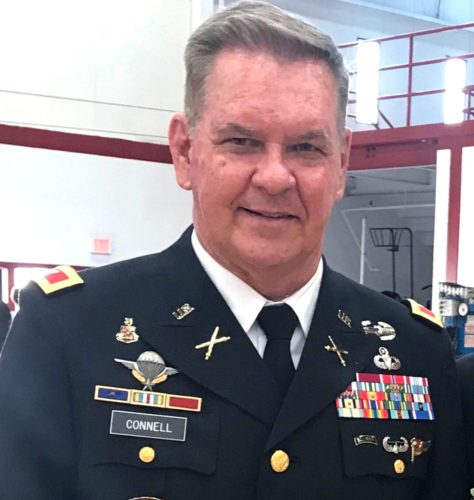LYNNFIELD — A number of factors contributed to the Taliban regaining control of Afghanistan, Select Board member and retired U.S. Army Col. Joe Connell said in an interview with the Villager.
Connell enlisted in the U.S. Army as a lieutenant on Oct. 1, 1985. After serving a tour in Somalia in 1993 and serving in Iraq from 2003-05, Connell was first deployed to Afghanistan with the 101st Airborne Division in 2007.
“I oversaw the planning and orchestrating of the lethal and non-lethal campaigns based out of Bagram Airfield for the division in what was Regional Command East,” said Connell.
“Although the war was initiated to hunt for Al-Qaeda and Osama bin Laden, the focus shifted over time to continuing to capture and kill enemies of the country for as long as it took. We were also trying to help rebuild Afghanistan in order to give Afghans freedom, self-governance and security.”
Connell recalled that the 101st Airborne Division helped build roads in Afghanistan, which he said was critically important in order to “move commerce around the country.” He also said it was important for U.S. forces to help rebuild Afghanistan’s financial and political institutions after decades of war.
“That was important to all of us because that is how a country moves on and people live in freedom,” said Connell. “That was very rewarding.”
After serving a year’s deployment with the 101st Airborne Division, Connell was appointed as the chief of staff for the United States Forces Afghanistan. He served under Gen. David McKiernan for a year.
“While I was with the 101st Airborne Division, it was decided that a new headquarters had to be stood up,” recalled Connell. “Gen. McKiernan served as both the NATO commander and the U.S. forces commander. No matter what U.S. force was deployed, it fell under his command and control.”
While Connell is “glad that the war is over,” he has serious concerns about the way the War in Afghanistan ended and how the Taliban regained control of the country 20 years after the Sept. 11, 2001 terrorist attacks.
“The military does not decide when we go to war,” said Connell. “It’s our politicians who send us, and it’s our politicians who decide when to end it. With that being said, I hope that the war was not ended without a sufficient and effective timeline directed by both the State Department and the Department of Defense to effectively execute a safe and well-planned withdrawal. When Gen. Mark Milley addressed the nation, he said, ‘We were given three weeks’ notice by the administration to evacuate all Americans and those identified as needing to be evacuated.’ I was concerned about whether it could be done safely in a restrained period of time. If the intent was to end the war prior to the 20th anniversary of 9/11, we made a big mistake. Military objectives should not be based on a significant anniversary’s date on a calendar.”
Connell said President Joe Biden should have given the Department of Defense more time to end the War in Afghanistan.
“This should have been identified with a lead time of at least six months, not three weeks,” said Connell.
Connell noted that U.S. armed forces built a number of schools around Kabul, and said girls were able to attend those schools. He recalled that the Taliban prohibited girls from getting an education and women from working during their previous reign from 1996-2001.
“We wanted girls to be able to get an education and we wanted women to pursue their careers,” said Connell. “When I was deployed from 2007-09, we had girls in school. Women were working and were serving in the government. We expended resources to make that happen. There were girls who have been in school for 12 years and that ended overnight. This is a tragedy for any country. It’s heartbreaking.”
Connell also said it has been “extremely difficult to see the immediate failure” of the Afghan Army and the country’s former government that fled Kabul while the Taliban was trying to recapture the capital city.
“The immediate destruction of the institutions in Afghanistan, including financial institutions, political institutions, the education system and the armed forces and police is very difficult to see after the United States and its allies took time to build them,” said Connell. “Seeing it happen so quickly is very upsetting and disappointing.”
Connell also said the U.S. should have transported the “thousands of prisoners detained at Bagram Airfield” to a different prison instead of releasing them.
“It compounded the problem,” said Connell. “We literally captured thousands of prisoners, who are really bad people, over a decade and released them. We could have transferred those prisoners to prisons outside of Afghanistan and outside of the United States. They have now rejoined their comrades. Their ultimate objective is to harm the United States and the free world now and in the future. This was a massive mistake at the highest levels of our government. If we made agreements with the Taliban, we have lost our moral compass.”
Connell also said the U.S. should have kept the Bagram Airfield, similar to how the U.S. has kept and maintained military bases in other countries such as Germany and South Korea.
“We do this all over the world,” said Connell. “Why not leave in place Bagram Airfield in Afghanistan? Those are questions for our politicians to answer.”
Connell also said the U.S. should have waited until late fall at the earliest to pull troops out of Afghanistan. He noted that August is “the height of the traditional fighting season.”
“The Taliban and Al-Qaeda do the least of their fighting from November through April because it’s their tradition to go home to visit their families, refit and rearm,” said Connell. “We have known this for 15 to 20 years. Ultimately, the Americans handed the country back to the same militants the U.S. drove from power in 2001.”
Connell said it was heartbreaking that 13 U.S. service members, including Lawrence native and U.S. Marine Sgt. Johanny Rosario Pichardo, were killed in a suicide bombing outside of Kabul International Airport last month. The bombing occurred while Americans and Afghan refugees were being evacuated from the country.
“If we had the assurances from the Taliban that they would support the evacuation, then why were U.S. service members at the initial checkpoint outside the airfield, working with the cooperating Taliban?” Connell asked. “The suicide bomber would have been identified early and there would have been less casualties than the 13 military service members who died. If our politicians had insurances and trusted agreements with the Taliban, then there shouldn’t have been any issue with a preliminary checkpoint outside the airfield. This was a failure of leadership on the ground and by the administration.”
Connell said the U.S. left behind military equipment that has an estimated value of $20 billion.
“The United States essentially equipped a terrorist organization with the best protective equipment, vehicles and infrastructure,” said Connell.
Connell said it was disappointing that Afghanistan’s security forces and the former government “collapsed under significant Taliban pressure and perceived U.S. abandonment.”
“What went wrong in Afghanistan? Plenty is the short answer,” said Connell. “It took 20 years of mistakes by the Afghan Army and coalition forces to create the defeat and debacle that played out in Kabul. I am glad that the war is over and I don’t want to be a Monday morning quarterback, but I do believe our calculations on the Afghan Army’s proficiencies and skills were extremely miscalculated. Our quick exit strategy was poorly planned and essentially hurt us. I do believe that the world just became a more dangerous place not only for the United States, but for our allies politically and militarily around the world.”






